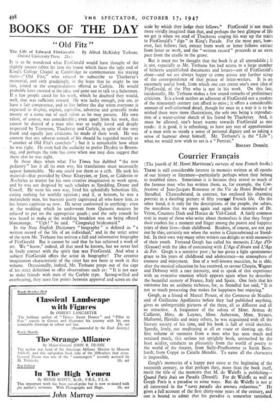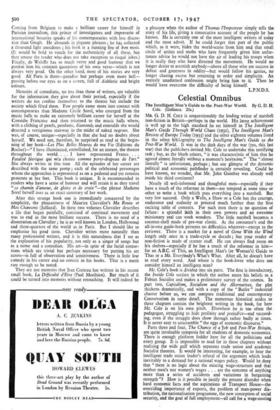Courrier Francais
(The fourth of M. Henri Martineau's surveys of new French books.) THERE is Still considerable interest in memoirs written at all epochs of our history or literature—particularly perhaps when they belong to troubled times. Sometimes it is because they reveal so much of the famous man who has written them, as, for example, the Con- fessions of Jean-Jacques Rousseau or the Vie de Henri Brulard. of Stendhal. Chateaubriand, in contrast, has enclosed his charming portrait in a dazzling picture of fifty yearoof French life. On the other hand, it is only for the descriptions of the people, the salons, the anecdotes that we open again and again the memoirs of Dr. Veron, Countess Dash and Horace de Viet-Castel. A fairly common trait in many of those who write about themselves is that they forget their readers for a moment and linger among the purest and happiest years of their lives—their childhood. Readers, of course, are not put out by this; certainly not when the writer is Chateaubriand or Stend- hal. In their own way many other writers can delight us with memories of their youth. Fernand Gregh has called his memoirs L'Age d'Or (Grasset) with the idea of continuing with L'Age d'Airain and L'Age de Per. Gregh is a sensitive poet • he has given a light spontaneous grace to his years of childhood an adolescence—an atmosphere of easiness and enjoyment. Son of a well-known musician, he is able, after the musical education he has received, to savour Chopin, Wagner and Debussy with a rare intensity, and to speak of this experience with an evocative emotion which appears again when he describes the beautiful scenery of France, Italy and Spain. One feels that his existence has an aesthetic richness, for, as Stendhal has said, "It is not so much possessing that makes for happiness but enjoying."
Gregh, as a friend of Marcel Proust, of the Comtesse de Noailles and of Guillaume Apollinaire before they had published anything, gives us unforgettable pictures of the three, all so different and all so attractive. A frequenter of the salons of Mme. Arman de Caillavet, Mme. de Loynes, Mme. Aubernon, Mme. Strauss, Mallarme, Heredia and many others, he was acquainted with all the literary society of his time, and his book is full of vivid sketches. Speedy, lively, not meditating at all en route or slowing up, this first volume of memoirs from a man who has seen much and retained much, this serious yet sprightly book, untouched by the least acidity, conducts us pleasantly from the world of poetry to the world of the theatre, from Sully-Prudhomme to Sarah Bern- hardt, from Copt*. to Catulle Mendes. To name all the characters is impossible.
Gregh's memories of a happy past cease at the beginning of the twentieth century, So that perhaps they, more than the book itself, merit the title of the memoirs that M. de Waleffe is publishing- Quand Paris itait un Paradis (Denoel). For de Waleffe as well as Gregh Paris is a paradise in some ways. But de Waleffe is not at all interested in the " verts paradis des amours enfantines." He gives a full account of the first thirty-nine years of the century, and one is bound to admit that his paradise is somewhat tarnished. Coming from Belgium to make a brilliant career for himself in Parisian journalism, this prince of investigators and impresario of international beauties speaks of his contemporaries with less discre- tion than Gregh. He abounds in piquant phrases; he ha.s collected a thousand light anecdotes ; his book is a running fire of bon mots. (It would be bold to vouch for the authenticity of all these, but they amuse the reader who does not take exception to risque jokes.) Finally, de Waleffe has so much verve and good humour that we pardon him his constant quotations of his own verse—which is not always very good. On the other hand, most of his stories are very good. All Paris is there—paradise but perhaps even more hell— passing before our eyes as on a screen, full of diablerie and bright colours.
Memoirs of comedians, no less than those of writers, are valuable for the information they give about their period, especially if the writers do not confine themselves to the theatre but include the society which feted them. Few people came more into contact with contemporaries than Madame Cecile Sorel, who emerged from the music halls to make an extremely brilliant career for herself at the Comedic Francaise and then returned to the music halls where, with a clicking of pearls, pendants, diamonds and emeralds she would descend a vertiginous stairway in the midst of naked negroes. She was, of course, unique—especially in that she had no doubts about herself. We need not, therefore, be surprised to read at the begin- ning of her book—Les Plus Belles Heures de ma Vie (Editions du Rocher)—" I have illuminated, embellished, for an instant, the theatre throughout the world. . . . I have represented France. . . . Fataliti Perique qui m'a choisie comme porte-drapeau de l'art." She always writes in this tone All the episodes of her career are described with the same pomp ; each of the celebrated personages whom she approaches is represented as on a pedestal and yet remains prostrate at her feet. This book is unique. It is recommended to readers who have a sense of humour and will retain it as they travel ce chemin d'amour, de gloire et de croix "—the phrase Madame Sorel herself uses as an exact summary of her work.
After this strange book one is immediately conquered by the simplicity, the pleasantness of Maurice Chevalier's Ma Route et Mes Chansons (Juffiard). In these two volumes Chevalier describes a life that began painfully, consisted of continual movement and was to end in the most brilliant success. There is no need of a dissertation on Chevalier ; he is as well known in London, Hollywood and three-quarters of the world as in Paris. But I should like to emphasise his good taste. Chevalier writes more naturally than many professional writers, and it is this naturalness that I see as the explanation of his popularity, not only as a singer of songs but as a mime and a comedian. His art—in spite of the facial contor- tions which are trivial but perhaps necessary for putting his art across—is full of observation and sensitiveness. There is little low comedy in his career and no conceit in his books. That is a merit rare enough to be noted.
They are not memoirs that Jean Cocteau has written in his recent small book, La Difficulte d'Etre (Paul Morihien). But much of it could be turned into memoirs without retouching. It will indeed be
a pleasure when the author of Thomas l'Imposteur simply tells the story of his life, giving a consecutive account of the people he has known. He is certainly one of the most intelligent writers of today and the most adroit. If he could forget that part of the public which, as it were, hides the world-scene from him and that small circle of artists and snobs who have frequently given him unfor- tunate advice he would not have the air of leading his troops when it is really they who have directed the movement. He would no longer desire to astonish anybody—above all those who see success in defeat and greatness in oddity—but would follow his genius, no longer chasing excess but returning to order and simplicity. An entirely unadorned confession might bring him to it. Then he would have overcome the difficulty of being himself.
L.P.N.D.S.



































 Previous page
Previous page